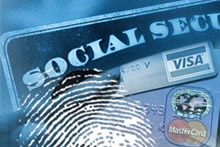
Every time you make a purchase you have an important decision to make: how will you pay for it? Cash, credit, debit, or checks are the most common – although we are seeing that last one less as debit cards take over. None of these methods are completely risk free, even carrying cash can put you at risk for classic theft, or just losing your wallet. Chances are that convenience is what fuels your decision, and identity theft is not likely to cross your mind. Often the winner is a credit or debit card, and you should understand how to protect yourself.
One of the most important things that you can do to protect yourself from ID theft is to closely monitor your account activity. Most companies let you check your account activity online as often as you like, and you should take advantage of this. Identify fraudulent charges as soon as possible, so you can cancel the card immediately, preventing any other charges. Don’t just wait for your monthly statements. If the theft were to start at the beginning of a billing cycle, by the time you receive your statements the thief may have spent a massive amount of money. Even if you check your accounts online, you should still make sure that you are receiving your monthly statements. Sometimes hijacking an account includes changing the address associated with the account in an attempt to prevent detection.
- Don’t put outgoing payments in an accessible mailbox. These include personal information, and are easily taken.
- Shred your receipts, statements, bills, and records before you throw them away.
- Carry only as many credit cards as you need.
- Pay with cash in restaurants. Waiters usually have to walk away with your card, and there have been many instances of dishonest employees using this opportunity to steal credit card information.
- If you have a chip-enabled credit card, shop at retailers that use the chip-reader technology. This helps protect you if that retailer is compromised.



